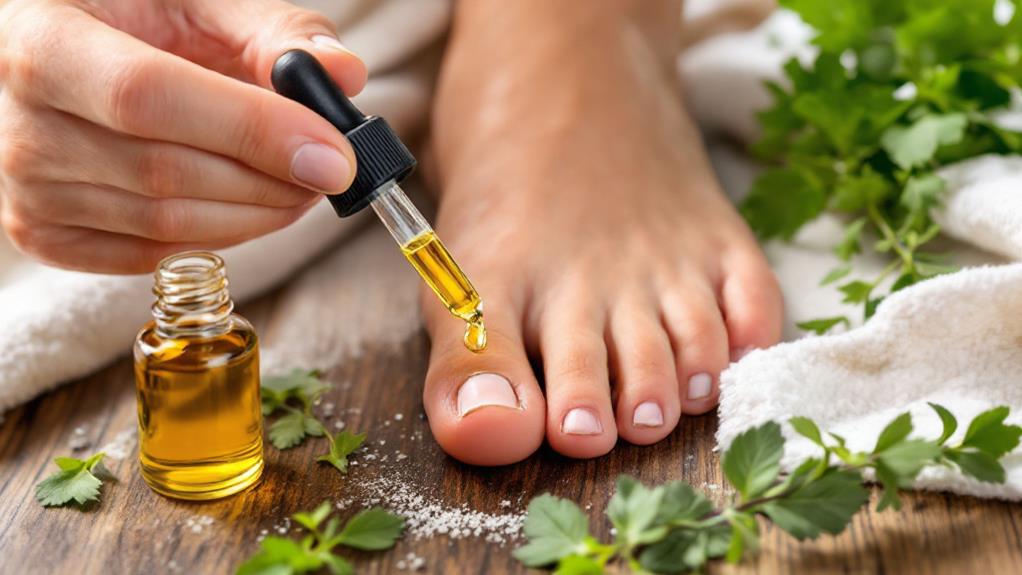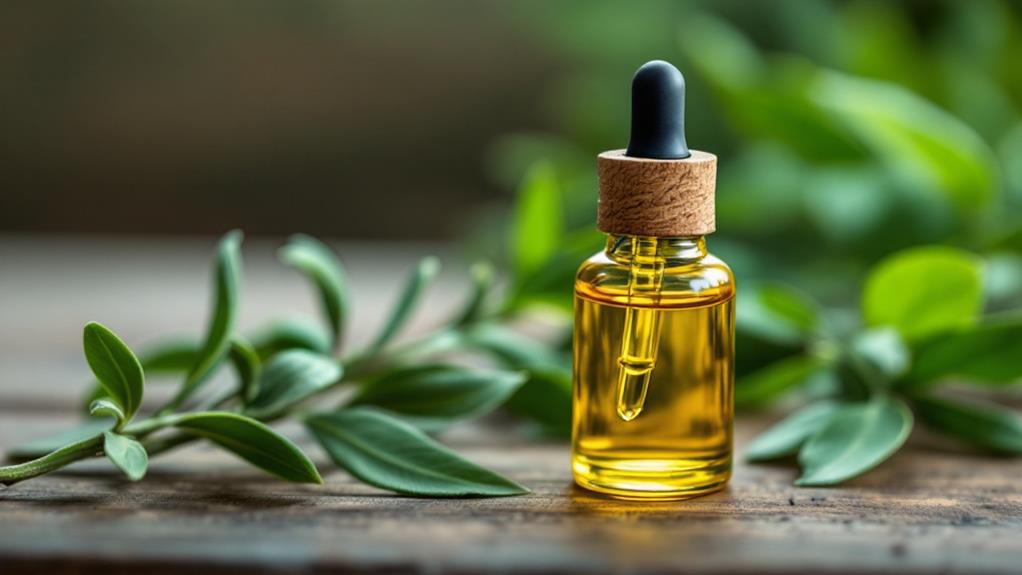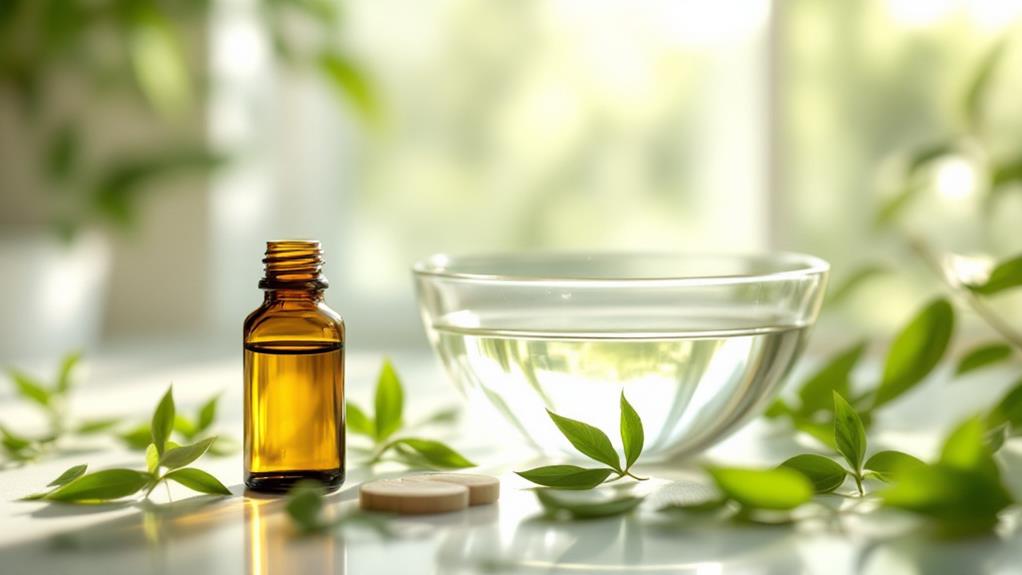Tea Tree Oil Uses and Benefits: A Comprehensive Guide
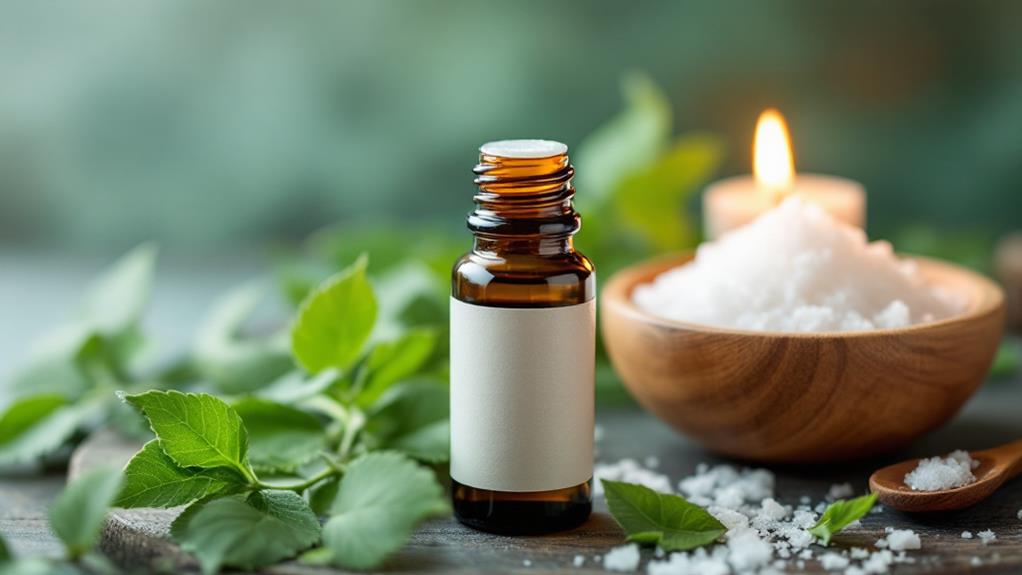
Tea tree oil is a powerhouse of natural benefits you can't overlook. It packs antimicrobial properties perfect for tackling skin issues like acne, cuts, and contact dermatitis. Beyond skincare, it promotes a healthy scalp, fights dandruff, and even eases lice. Around the home, it disinfects surfaces, freshens laundry, and purifies air. Its insect-repelling abilities make it a natural choice for pest control. Use it in mouthwash to combat bad breath and gum disease, but never ingest it. Remember to dilute properly and patch test to guarantee safety. Plunge deeper and uncover more practical insights and usage tips.
Historical Context and Origins
Many might not know that tea tree oil's expedition began in the native lands of eastern Australia. Derived from the leaves of the Melaleuca alternifolia tree, this oil boasts a rich history deeply rooted in the traditions of Aboriginal Australians. Long before its introduction to Western medicine, these indigenous people utilized the tree's leaves for their remarkable medicinal properties. They applied crushed leaves directly to wounds and used them to relieve respiratory ailments, showcasing the plant's therapeutic properties through traditional uses.
In the 18th century, sailors, including Captain James Cook, stumbled upon these practices. They brewed tea from Melaleuca alternifolia leaves, dubbing the source "tea tree." These sailors recognized its potential benefits, leading to a growing interest in tea tree oil's therapeutic properties. Cook's encounters with Aboriginal Australians helped popularize the oil, bringing attention to its numerous historical uses.
However, it is crucial to note that tea tree oil is not intended for internal consumption. Despite its many benefits, the oil can be toxic if ingested. This key aspect highlights the significance of understanding its proper use, ensuring you harness its full potential safely.
Composition and Extraction
Understanding tea tree oil's rich history naturally leads to exploring what makes it so effective today. At the heart of its potency is its careful extraction process. Tea tree oil comes from the leaves and twigs of the Melaleuca alternifolia tree, native to Australia. This extraction involves steam distillation, a method that guarantees the purity of the oil while maintaining its beneficial properties. The oil's main active component, terpinen-4-ol, is celebrated for its robust antibacterial and anti-inflammatory properties, making it a powerful natural remedy.
High-quality tea tree oil exhibits a high concentration of terpinen-4-ol and low levels of cineole. This balance is essential as it guarantees the oil's safety and effectiveness when applied topically. Seasonal harvesting plays a role in the oil's quality and yield; for instance, winter yields are typically lower compared to warmer months.
Tea tree oil is available in different concentrations, ranging from 5% to 100% undiluted. For sensitive skin, diluted forms are recommended to prevent irritation while still providing therapeutic benefits. By understanding this intricate composition, you can make informed choices about incorporating tea tree oil into your routine.
Health and Wellness Benefits
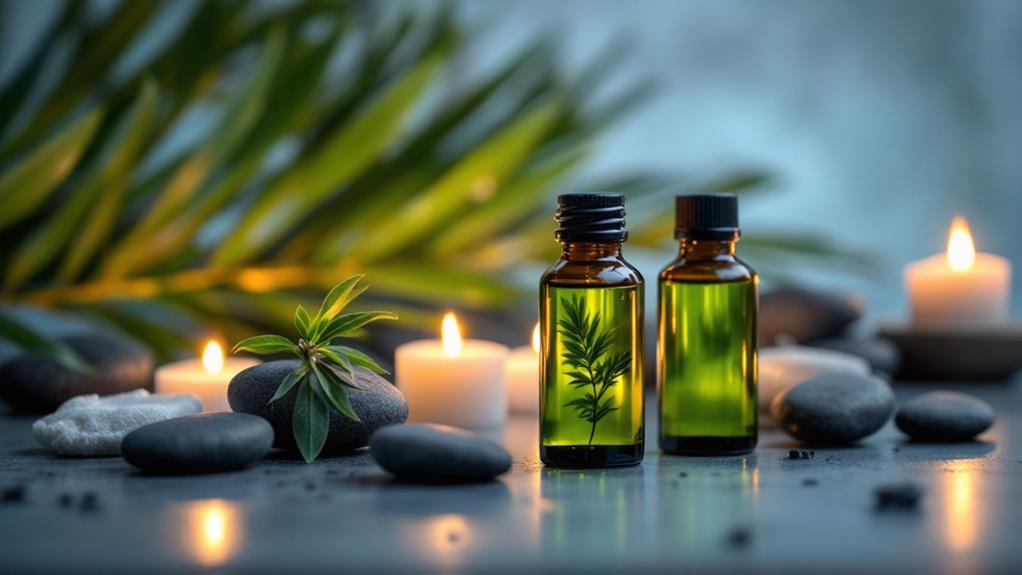
With its remarkable properties, tea tree oil serves as a versatile tool in health and wellness. Thanks to its broad-spectrum antimicrobial properties, tea tree oil is effective against a variety of bacteria, fungi, and viruses. This makes it a reliable choice for addressing numerous infections and skin conditions. In terms of acne treatment, tea tree oil is a game changer. By using topical application, you can considerably reduce inflammatory lesions, redness, and swelling associated with acne.
Tea tree oil's antifungal properties make it particularly beneficial for treating athlete's foot. Research shows that using tea tree oil can lead to improved symptoms compared to placebo treatments. For scalp health, a tea tree oil shampoo can be a lifesaver, reducing dandruff symptoms by 41% and alleviating itchiness. It's an excellent way to maintain a healthy scalp.
Moreover, tea tree oil has demonstrated potential in promoting oral health. A 2020 study suggests that a tea tree oil mouthwash might be somewhat more effective than chlorhexidine for treating gingivitis. These impressive health benefits highlight how incorporating tea tree oil into your routine can improve your general wellness.
Skin Care Applications
Beyond its health and wellness benefits, tea tree oil shines in skincare applications, offering a natural solution to common skin issues. If you struggle with acne vulgaris, tea tree oil could be your new best friend. Thanks to its powerful antibacterial and anti-inflammatory properties, it helps reduce inflammatory lesions, making your skin clearer and healthier. Studies show that topical formulations with tea tree oil can markedly decrease acne severity, making it an effective alternative to harsher treatments.
Tea tree oil's uses don't stop at acne. With its antiseptic qualities, it's great for treating minor cuts and scrapes. By targeting bacteria like Staphylococcus aureus, it prevents infections and promotes quick healing. If you have inflamed skin conditions such as contact dermatitis, tea tree oil can alleviate symptoms. Research indicates it reduces allergic contact dermatitis by 40.5% compared to standard treatments.
Additionally, tea tree oil's antioxidant properties help slow skin aging, reducing fine lines and wrinkles. Its natural astringent effects make it perfect for oily skin, tightening and toning your complexion. Incorporating tea tree oil into your skincare products can transform your regimen, offering a holistic approach to skin care.
Hair Care Uses
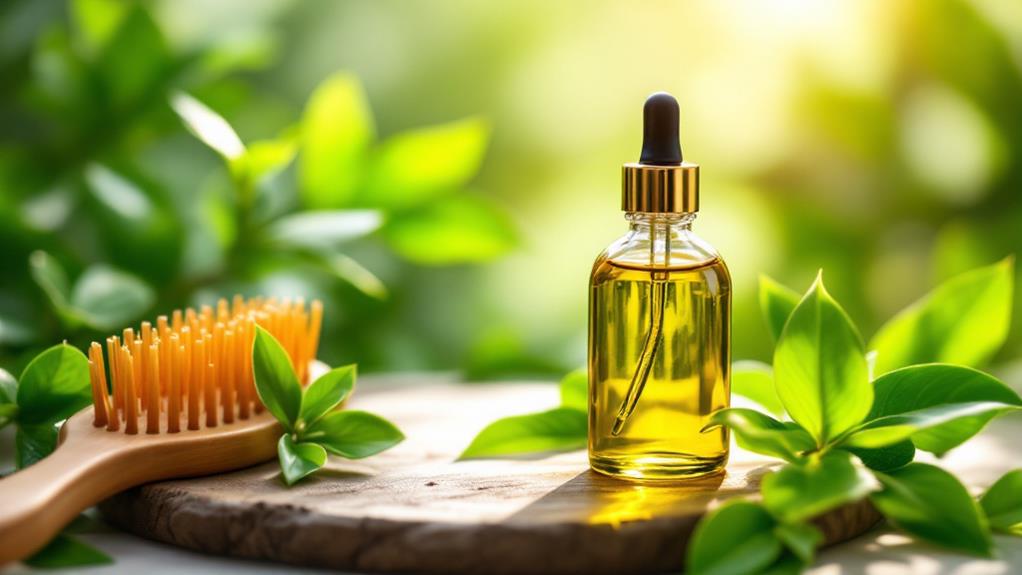
Harnessing the power of tea tree oil can improve your hair care routine to new heights. This natural oil offers numerous benefits, particularly for maintaining a healthy scalp and tackling common hair issues. Tea tree oil's antimicrobial properties make it a popular choice in hair care products, effectively maintaining a clean environment for your scalp, which may reduce hair loss by strengthening your hair follicles.
Here's how tea tree oil can transform your hair care routine:
- Dandruff Reduction: Using a tea tree oil shampoo can greatly improve dandruff symptoms. Studies show a 41% reduction in dandruff when used regularly, providing relief from itchiness and irritation.
- Soothe Dry Scalp: Tea tree oil is renowned for soothing a dry scalp. Its regular application can alleviate discomfort, promoting better scalp health.
- Lice Treatment: This oil is a natural remedy for lice, demonstrating effectiveness against lice infestations and other scalp parasites, making it a valuable supplement to your lice treatment arsenal.
- Healthy Scalp: By incorporating tea tree oil into your routine, you promote a healthier scalp, thanks to its ability to maintain cleanliness and support follicle strength.
Incorporate tea tree oil into your hair care regimen and enjoy the benefits of a healthier, more lively scalp.
Household Cleaning Solutions
Tea tree oil is a powerhouse in household cleaning, offering a natural and effective way to disinfect your home. With its strong antimicrobial properties, it's an excellent choice for tackling mold and bacteria on surfaces like kitchen counters and bathroom tiles. Instead of relying on harsh chemicals, you can create a DIY cleaning solution by mixing 10 drops of tea tree oil with 2 cups of water and 1.5 cups of vinegar. This mixture provides a non-toxic cleaning option that's safe for both your family and the environment.
For your laundry needs, tea tree oil is similarly impressive. Just three drops in your washing machine can effectively eliminate odors while disinfecting clothes, leaving them fresh and clean. This makes tea tree oil an ideal choice for those looking to maintain a healthy home without compromising on cleanliness.
Diffusing tea tree oil in the air can also purify indoor environments, reducing the bacterial and viral load. This promotes a healthier living space, making it easier for you to breathe and enjoy your home. Welcome tea tree oil's benefits and transform your household cleaning routine into a more natural and effective process.
Oral and Dental Care
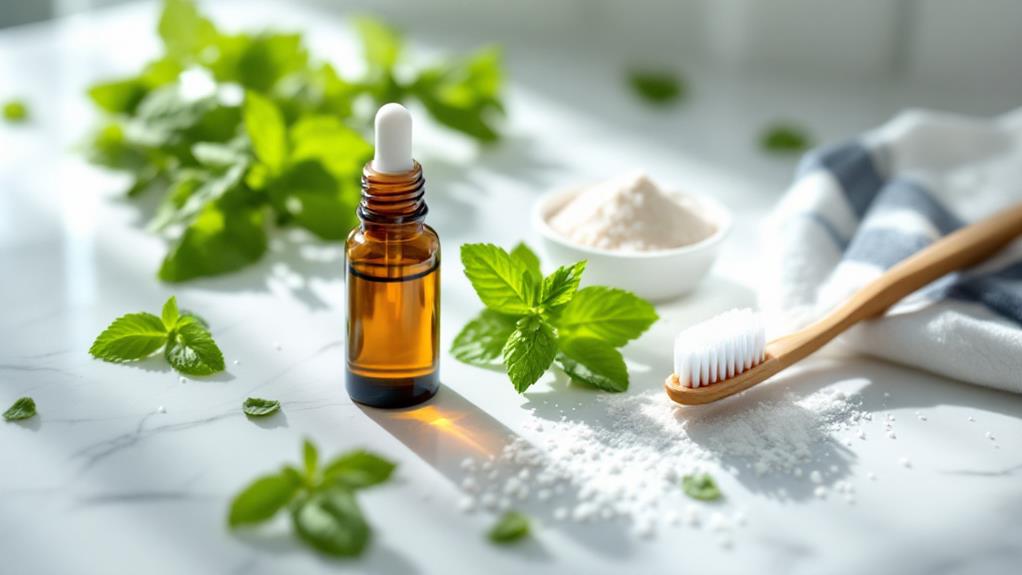
Some might be surprised to learn that tea tree oil can play a role in oral and dental care. Thanks to its antibacterial properties, it can help reduce harmful bacteria in your mouth, offering several oral health benefits. A tea tree oil mouthwash might be just what you need to tackle common oral issues. Here's how it can help:
- Combat Gingivitis: A small 2020 study found that a tea tree oil mouthwash showed slight superiority over chlorhexidine in treating gingivitis.
- Prevent Bad Breath: By reducing bacteria, tea tree oil can help keep your breath fresh and pleasant.
- Enhance Oral Hygiene: A 2021 systematic review suggested improvements in overall oral hygiene with tea tree oil, though further research is needed.
- Ease of Use: Just remember to properly dilute tea tree oil before use to minimize irritation and adverse effects.
While it's effective, it's important to note that tea tree oil is toxic if swallowed. Always verify it's used correctly to avoid serious health complications. With these tips, you can incorporate tea tree oil into your oral hygiene routine safely and effectively.
Insect and Pest Control
In the domain of insect and pest control, tea tree oil stands out as a natural powerhouse. You can rely on this crucial oil as an effective insect repellent, especially when dealing with mosquitoes. Studies have shown that tea tree oil can outperform DEET, offering a strong, chemical-free alternative. Its natural treatment capabilities extend beyond mosquitoes, as it's also a potent solution against head lice. By blending tea tree oil with carrier oils or shampoos, you can apply it directly to the scalp to eliminate both lice and their eggs without resorting to harsh chemicals.
But tea tree oil's benefits don't stop there. It's versatile enough for broader household pest control, deterring other pests such as house flies and fleas. Imagine improving your indoor air quality while keeping these nuisances at bay—simply use tea tree oil in a diffuser or as a spray solution. The aroma not only elevates your home environment but also acts as a robust natural insect repellent. Utilize tea tree oil as a multi-functional tool in your pest control arsenal, offering a safe, effective way to manage unwanted insects and pests.
Safety and Precautions
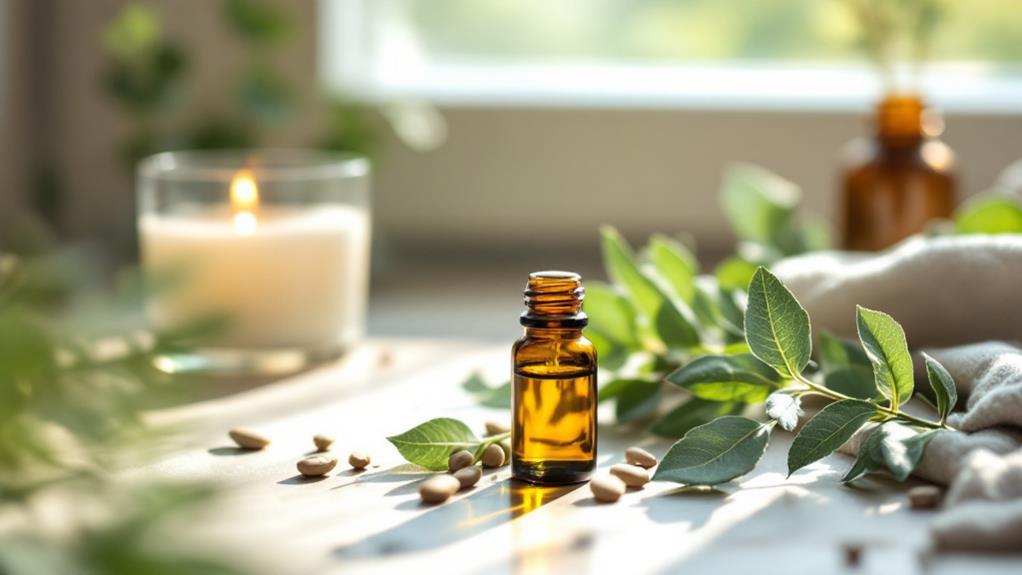
When using tea tree oil, safety must be your priority. To prevent any adverse reactions, follow these precautions. Initially, never ingest tea tree oil. It's toxic and can cause serious health issues like gastrointestinal distress and confusion. Furthermore, always conduct a patch test before your initial use. This helps identify any potential skin sensitivities, as tea tree oil may cause irritation or allergic reactions.
Here's a quick guide to guarantee safe usage:
- Dilution: Always dilute tea tree oil with carrier oils, like coconut or jojoba oil, especially if you have sensitive skin. This reduces the risk of irritation.
- Limit Exposure: Avoid prolonged or repeated exposure to minimize side effects such as dermatitis, itching, or, in rare cases, gynecomastia in young boys.
- Consult Professionals: Always consult healthcare professionals before using tea tree oil, especially if you're pregnant, nursing, or have existing skin conditions.
- Monitor Reactions: Keep an eye on your skin for any signs of irritation or allergic reactions, and stop use immediately if they occur.

